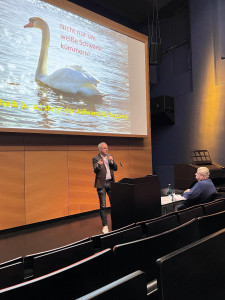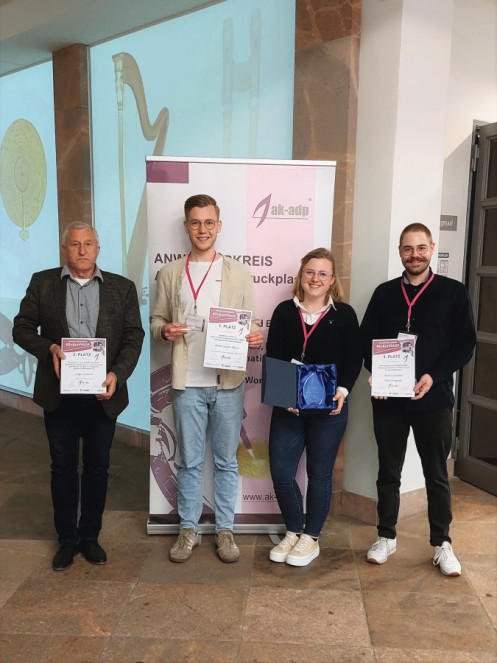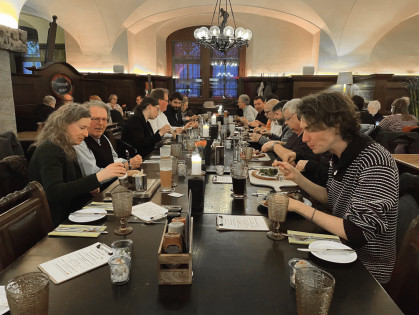The #ZukunftADP competition, organized by the Atmospheric Pressure Plasma Application Group (ak-adp) for the first time in 2021, continued in 2023 in search of the future topics of plasma research and its industrial and medical use. The competition was a focus of the 43rd workshop of the atmospheric pressure plasma user group ak-adp on the topic of "Industrial dialog for sustainability" from 26-27 April 2023.
Interesting presentations on a wide range of applications for atmospheric plasmas were the focus of the first day of the 43rd workshop at the Grassi Museum in Leipzig. The focus was on the transfer of technological developments into industrial applications. Atmospheric plasmas have already proven their potential as innovative solutions for both localized and large-scale surface treatments many times over. In addition to a variety of technical applications for the surface modification of plastics and metals, textile materials and composites, this also applies to agricultural applications in the pre-harvest process.
 Speaker Peine-Paulsen's presentation David Hartung from the Fraunhofer Institute for Microstructure of Materials and Systems (IMWS) in Schkopau was a good example. He presented plasma technology studies for the production of fiber-reinforced plastics. The focus was on the interface design of the fiber-plastic composites and the fiber-plasma treatment for good bonding to the matrix material. Various plasma sources were tested comparatively. The resulting functional groups were detected using FTIR. The crack propagation across and in the direction of the fiber orientation was determined on carbon fiber-reinforced plastics using micromechanical test methods. Treatment with N2 was shown to be particularly effective. In the case of natural fibers (e.g. flax), strong hydrophilization was achieved, resulting in a clear increase in the strength of the composite material.A good example of industrially implemented plasma technology developments was presented by Jürgen Schmidt from Innovent e.V. Jena. The plasma-chemical oxidation developed for light metals is used at Swarovski-Optik AG & Co KG for blackening magnesium components for use in optical device construction. The coating provides a highly absorbent surface that is used in the frames and housings of optical systems to minimize extraneous and scattered light effects.
Speaker Peine-Paulsen's presentation David Hartung from the Fraunhofer Institute for Microstructure of Materials and Systems (IMWS) in Schkopau was a good example. He presented plasma technology studies for the production of fiber-reinforced plastics. The focus was on the interface design of the fiber-plastic composites and the fiber-plasma treatment for good bonding to the matrix material. Various plasma sources were tested comparatively. The resulting functional groups were detected using FTIR. The crack propagation across and in the direction of the fiber orientation was determined on carbon fiber-reinforced plastics using micromechanical test methods. Treatment with N2 was shown to be particularly effective. In the case of natural fibers (e.g. flax), strong hydrophilization was achieved, resulting in a clear increase in the strength of the composite material.A good example of industrially implemented plasma technology developments was presented by Jürgen Schmidt from Innovent e.V. Jena. The plasma-chemical oxidation developed for light metals is used at Swarovski-Optik AG & Co KG for blackening magnesium components for use in optical device construction. The coating provides a highly absorbent surface that is used in the frames and housings of optical systems to minimize extraneous and scattered light effects.
Large-area roll-to-roll processes are the order of the day in mass production. Atmospheric plasmas are also used here. Special plasma sources enable the treatment of roll goods such as films with a width of up to 10 m and a process speed of up to 1000 m/min. Depending on requirements, activation or coating can be realized by varying the plasma parameters, process gases and optionally the precursors. Prof. Dr. Michael Thomas from the Fraunhofer Institute for Surface Engineering and Thin Films (IST) in Braunschweig was able to demonstrate various sustainable examples of atmospheric pressure plasma processes from roll to roll from the R2R NET network - from activation to coating, such as the effective adjustment of surface energy for subsequent processing, dirt-repellent wood decors and adhesive-free joining.
A new application of atmospheric plasmas for many workshop participants was the focus of Dr. Henrike Brust's presentation. The Leibniz Institute for Plasma Science and Technology (INP) Greifswald has been researching the potential and challenges of plasma applications for agriculture for several years. The aim is to limit or minimize the use of chemicals such as fertilizers and to protect against pests and microorganisms by killing pathogens. Plasma can be used to influence metabolic processes. Seed treatment is carried out with direct plasma and/or plasma-treated air. Plasma-activated water is suitable for treating growing plants, and a presentation on new methods of surface and coating characterization for the quality control of plasma treatment highlighted the optical inspection of ultra-thin SiOx coatings during production. Extensive discussion opportunities during the presentations and coffee breaks were gladly used and continued at the established regulars' table.
The #ZukunftADP(www.ak-adp.de/zukunftsarena/" target="_blank">https://www.ak-adp.de/zukunftsarena/) competition, organized by ak-adp for the first time in 2021, was continued in 2023 in search of the future topics of plasma research and its industrial use. The entries submitted by students and renowned scientists were presented and awarded prizes on the 2nd day of the workshop. The winner - Martin Leander Marxen from Christian-Albrechts-Universität in Kiel - can look forward to financial support of 1000 euros to continue his research work on the "Reduction of N2 andCO2 to higher-value molecules using plasma-assisted electrocatalysis", which is relevant to the energy transition. Second place in the competition for the future went to an entry from Innovent. Oliver Beier, Jun Xu and Jürgen Schmidt presented the use of atmospheric pressure plasmas for the activation and functionalization of surfaces prior to chemical metal deposition with their competition entry "Resource- and environmentally friendly methods for the activation of dielectric surfaces for subsequent chemical metallization". Third place went to Madleen Westphal and Tobias Landgraff from the TH Lübeck with a contribution from the field of additive manufacturing entitled "Atmospherically plasma-treated polymer base plates in 3D printing of plastic components".
 Last but not least,the technically exciting workshop was rounded off with a presentation on data security with a focus on current industrial espionage and computer security - a topic that concerns everyone and can suddenly affect us very closely in everyday life. We live in the information age; information is virtually hard cash. Today, there is a critical dependency on any infrastructure. Digital infrastructure needs analog competence. It was also possible to take part in a special tour of parts of the restoration workshops of the Museum of Applied Arts and the Museum of Ethnology as part of the workshop. Here, the potential of plasmas as a tool for restoring museum objects was discussed using specific collection items. Further collaboration with the restorers is planned.
Last but not least,the technically exciting workshop was rounded off with a presentation on data security with a focus on current industrial espionage and computer security - a topic that concerns everyone and can suddenly affect us very closely in everyday life. We live in the information age; information is virtually hard cash. Today, there is a critical dependency on any infrastructure. Digital infrastructure needs analog competence. It was also possible to take part in a special tour of parts of the restoration workshops of the Museum of Applied Arts and the Museum of Ethnology as part of the workshop. Here, the potential of plasmas as a tool for restoring museum objects was discussed using specific collection items. Further collaboration with the restorers is planned.
 Stammtisch We look forward to more interactive and informative face-to-face workshops in 2023! At the next ak-adp workshop on September 27 and 28, 2023, scientists and physicians will meet in Göttingen to discuss the current state of plasma medicine on the path from research to application-ready therapy.
Stammtisch We look forward to more interactive and informative face-to-face workshops in 2023! At the next ak-adp workshop on September 27 and 28, 2023, scientists and physicians will meet in Göttingen to discuss the current state of plasma medicine on the path from research to application-ready therapy.
Preview: 45th ak-adp workshop 15-16.11.2023 "Liability problems?! - Not with us!" in Bamberg. Together for more sustainability, quality and efficiency. With panel discussion ak-adp-talk on the topic of measurement technology + AI for atmospheric pressure plasma technologies = innovative and sustainable production processes for a safe future.
At www.ak-adp.de you will find up-to-date information on the following workshops as well as online registration. The registration of exhibition stands and posters is possible by arrangement. Please note the deadline for discounted registration. "Shaping the energy transition with atmospheric plasma - impulses for sustainability and economic efficiency" - presentations on this workshop topic can be submitted for April 2024.
If you are interested in further training events on atmospheric plasmas, please contact us. Dates for the 2-day seminars on plasma technology in the triad of theory, practice and analysis can be arranged as required. It is also possible to put together individual modular training courses.


